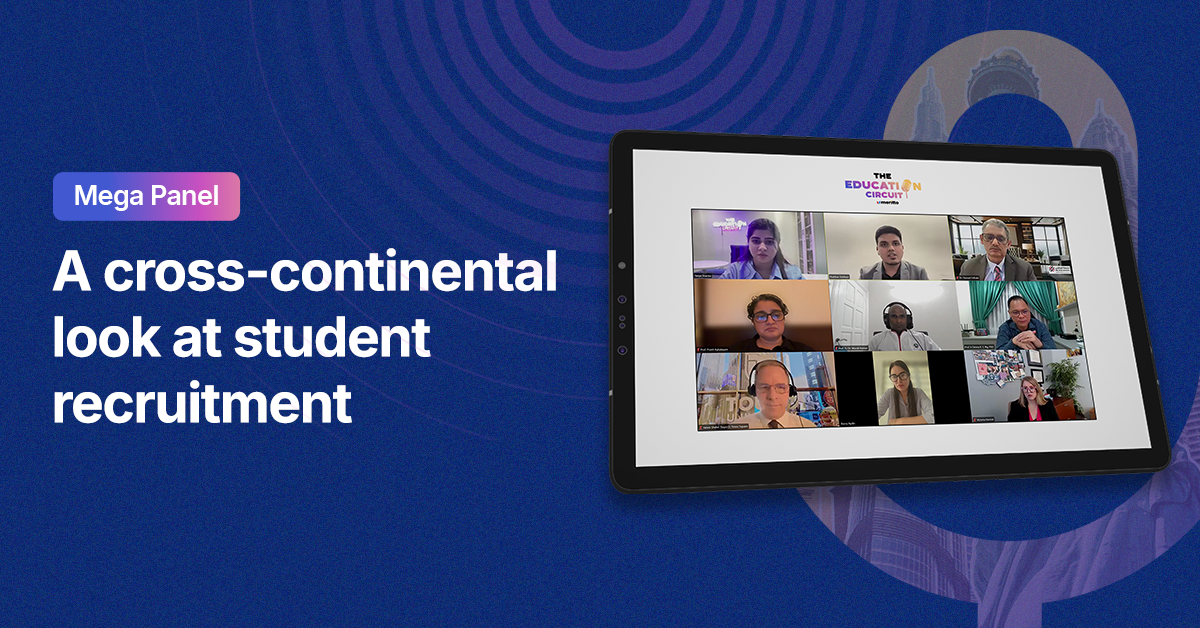Student recruitment today is shaped by a complex and interconnected set of global realities. From shifting student expectations to geopolitical developments and regional constraints, institutions around the world are adapting to a rapidly evolving enrollment landscape.
To better understand this transformation, we hosted a special edition of #EducationCircuitByMeritto, featuring a distinguished panel of 8 leaders from the USA, UAE, Malaysia, and India. In a rare alignment of time zones and leadership calendars, this global conversation centered around one vital question: How can educational organizations keep pace with the evolving dynamics of student recruitment in a globalized world?
Here are the key ideas and takeaways from this landmark episode:
Why cross-border collaboration is no longer optional
As competition intensifies and students explore new hybrid pathways, institutions must think globally and act locally. Our experts highlighted how collaboration across borders with trusted agents, global partners, and local communities, is key to staying relevant.
“Collaboration today means truly engaging with agency partners who understand local student needs,” said James Shafer, Director of International Student Recruitment at Touro University. “More students are exploring hybrid pathways, such as starting in India and transferring later to the U.S. Others are opting for online learning to manage costs.”
Dr. Murali Raman, Deputy Vice Chancellor at Asia Pacific University, emphasized: “In a fast-changing landscape, institutions can’t rely on a one-nation approach. Shared insights and data-driven strategies help build more resilient recruitment models.”
What’s shaping international student decisions today?
The panel stressed that academic quality alone isn’t enough. Students are weighing political climate, economic factors, ROI, and career pathways when choosing ‘where’ and ‘how’ to study.
Victoria Herrick, Associate Director of Undergraduate Admissions at Old Dominion University, shared: “Many students are questioning the return on investment of a degree. To stay relevant, institutions need to align their strategies with real-world outcomes, career opportunities, internships, and job-readiness.”
This shift also reflects how enrollment choices are increasingly driven by clarity, not just prestige.
Redefining “value” in global higher education
Today’s families are cost-conscious, ROI-focused, and expect a clear roadmap to success. Reputation still matters but it’s now tied to outcomes.
As Burcu Aydin, Educational Leader in the MENA region, noted: “Students today are clear about what they’re signing up for. They evaluate employability and alumni success networks before committing.”
Prof. Ir Denny K. S. Ng, Dean at Sunway University, added a tech-driven perspective: “With AI and tools like ChatGPT, students are more aware of how technology can enhance their learning. We must adapt our curricula and delivery to reflect this awareness.”
This redefinition of value urges institutions to rethink what they promise and deliver, beyond just academic degrees.
Evolving recruitment strategies amid geopolitical uncertainty
Visa backlogs, economic pressures, and unpredictable political environments are pushing institutions to become more agile. The panel discussed a shift toward:
- Diversifying source markets
- Providing flexible enrollment pathways
- Enhancing student support and communication
Trust-building through transparency and responsiveness was a recurring theme, ensuring students and families feel supported in uncertain times.
The growing role of technology in recruitment and admissions
Institutions are using AI, automation, and CRM systems to enhance every step of the student journey, from inquiry to enrollment.
Dr. Hamad Odhabi, Vice Chancellor for AI & Operational Excellence at Abu Dhabi University, explained:
“AI is playing an important role in shaping marketing materials, guiding enrollments, and helping institutions qualify leads and engage students effectively.”
The result: faster outreach, better personalization, and smarter support systems that meet students where they are, digitally and emotionally.
Global best practices worth adopting
Across the panel, one theme came through strongly: the future of student recruitment lies in building trust through intentional, inclusive, and tech-enabled engagement. From strengthening school and government partnerships to making outreach more accessible across geographies, institutions are rethinking how they connect with prospective students.
Prof. Preeti Aghalayam, Director In-Charge of IIT Madras – Zanzibar Campus, shared: “We see the power of using innovation to make outreach more inclusive and accessible. That intent, reaching students equitably through technology, is something everyone can learn from.”
Key takeaways
In an increasingly global and dynamic higher education landscape, student recruitment strategies must evolve beyond regional silos. Institutions that embrace collaboration and agility are better positioned to meet student expectations. This mega panel highlighted that successful recruitment today requires institutions to:
- Collaborate across borders to exchange insights, adapt proven practices, and stay ahead of global trends.
- Understand and respond to shifting student priorities, from career outcomes and affordability to personalized support and inclusivity.
- Redefine value by focusing on relevance, long-term impact, and the overall student experience, not just rankings or campus location.
- Stay agile in the face of visa, economic, and policy uncertainties by diversifying markets, offering flexible options, and maintaining clear communication.
- Leverage technology not only for efficiency but to make recruitment more personalized, timely, and responsive to changing student needs.
Final thoughts & Next Steps
As student recruitment grows more interconnected and complex, institutions must rethink traditional strategies and embrace a more collaborative, adaptive, and globally informed approach. This mega panel reinforced that long-term enrollment success lies in understanding evolving student expectations, learning from diverse practices, and staying agile in a rapidly competitive education landscape. Missed the podcast? The full recording is now available here and to know more, schedule a personalized demo today.
- How Voice AI Agents scale student engagement and lead nurturing
- The 3P framework for predictable student enrollment growth in 2026
- What’s shaping student recruitment, retention, and reputation in the UAE
- Inside the UAE’s shift toward AI-driven higher education
- What’s new at Meritto: The quarterly roundup




